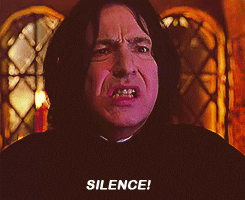With Halloween right around the corner, this is the perfect time to discuss a common theme in the world of writing: fear.

It’s widely reported that most people are more afraid of public speaking than death. I am one of those people. Despite how casual and cucumber-cool I come off on this blog, let the record show I am much more comfortable communicating through writing than I am through speaking.
Throughout my years in the corporate world, I’ve participated in numerous seminars and courses to help develop my public speaking skills. I’m basically an expert at the learning part – I’ll never master the doing.
Still, recently I was fortunate to attend Ty Boyd’s Excellence in Speaking Institute with a few colleagues. It was an intensive two-and-a-half-day experience that was exhausting but eye-opening. In particular, one piece of advice stood out: “Get comfortable in the silence.”
I’m one of those people who think any great lesson applies to all of life and not just a particular subject, and this line is no different.
Get comfortable in the silence.
Applying the lesson
Being comfortable in silence is a hard ask in today’s world, given the vast availability to be at beck and call. We’re constantly on one device or another that allows us fingertip access to anyone and everything. And if we’re not the ones talking, then we’re definitely listening, waiting for comments or a jumping off point.
As it applies to writing, silence might seem nonexistent, but I assure you silence is prevalent in all great works. There’s beauty in what is open to interpretation, intelligence in what isn’t said.
Think about your last email. Did you use the phrase “Let me know!” or something similar? Why? Assuming you wrote a question in the email, what made you feel like you needed to add that last line before your signature?
Get comfortable in the silence.

When you’re writing your proposal, taking the time to understand what your client needs to know and avoiding wasting their time with what they don’t will earn you major brownie points. Related, if silence is golden, then not repeating yourself is most definitely a silver medal.
And it doesn’t stop there.
When it comes to the design, think of white space as the silence. There’s nothing worse than a proposal so full of content that the point gets lost in the clutter. Use white space to force your reader’s eyes where you want them to go. Plus, using white space to give your reader’s eyes a break will allow them to focus more on what you have to say.
Writing doesn’t have to be scary – but neither do clowns, and I think we can all agree they totally are. So, what are your writing fears?
Let me know!
Don’t be sad. We’ll be back on the first Monday next month with a new blog post. If you can’t wait that long—whether because you have a topic you’d love us to cover, a question or you simply want to throw your two cents into the pot—we love talkin’ shop, so drop us a line.






